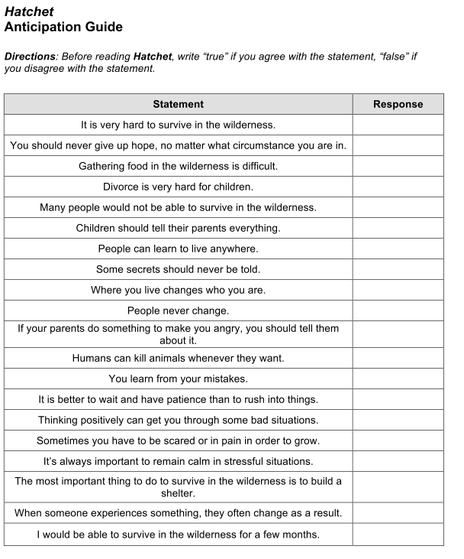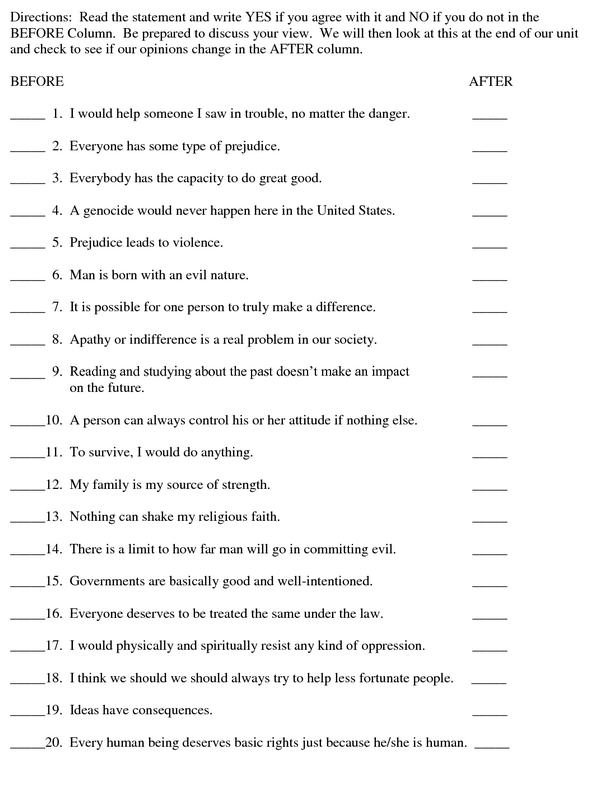What is an Anticipation Guide?
|
VideosIn this video, 7th Grade Science Teacher, Brad Aurand uses an anticipation guide to motivate students to learn his lesson. Mr. Auraund then leads the class in a discussion based on the students' responses to the statements. The video displays active engagement for all students, as they are seen working with peers, as well as a whole-class discussion.
This Reading Rocket's video shows a second grade classroom using an anticipation guide. The teacher uses the strategy to get students excited about the story they are about to read. The students in the video seem interested in the task, and thoughtfully consider each statement. The teacher models the activity and gives clear directions.
|
How can I use this strategy?
In a reading class, an anticipation guide could be used prior to reading a novel, such as Gary Paulsen's Hatchet. Questions on the anticipation guide would refer to themes from the book, such as survival, parent-child relationships, and perseverance. Students would complete the anticipation guide prior to reading, and a class discussion would follow. This activity would stimulate the ideas students will soon read about in the book.
In a history class, prior to a Holocaust unit, an anticipation guide could get students to begin considering some of the crucial aspects of the Holocaust. In this case, it is important to note that the statements should not have a right or wrong answer, but rather be something anyone could agree or disagree with.
In a history class, prior to a Holocaust unit, an anticipation guide could get students to begin considering some of the crucial aspects of the Holocaust. In this case, it is important to note that the statements should not have a right or wrong answer, but rather be something anyone could agree or disagree with.
|
Resources
|
Incorporate Writing
Writing is tied to this standard best by asking students to write an explanation of why they agreed or disagreed with the statement. Depending on the ability level of students, and the length you would like the assignment, this could be a sentence, a paragraph, or even an essay. Common Core Standard ELA-Literacy.W.6.1 states “Write arguments to support claims with clear reasons and relevant evidence” (English Language Arts, n.d.).
|
Examples of Anticipation Guides:
|
This Hatchet Anticipation guide is designed for a middle level reading class. Students write true if they agree, and false if they disagree. The statements connect to themes the students will encounter while reading Hatchet by Gary Paulsen.
|
This anticipation guide is designed for a history class studying the Holocaust. Students write yes to agree, and no to disagree with the statements. This activity will be repeated after the unit. It would be interesting to see if students' opinions change.
|
References:
Anticipation Guide. (n.d.). Retrieved May 18, 2015, from http://www.readingrockets.org/strategies/anticipation_guide#watch
Anticipation Guide. (2012, March 19). Retrieved May 18, 2015, from https://www.youtube.com/watch?v=jQCKXQUquTc
Anticipation Guide Teaching Strategy. (2011, January 11). Retrieved May 19, 2015, from https://www.youtube.com/watch?t=297&v=s7ztfDG5fec
Beers, K. (2003). When kids can't read, what teachers can do: A guide for teachers, 6-12. Portsmouth, NH: Heinemann.
English Language Arts Standards » Writing » Grade 6. (n.d.). Retrieved May 18, 2015, from http://www.corestandards.org/ELA-Literacy/W/6/
Harvey, S., & Goudvis, A. (2007). Strategies that work teaching comprehension for understanding and engagement (2nd ed.). Portland, Me.: Stenhouse
Las Cruces Public School District. (2010, March 11). Retrieved May 18, 2015, from http://old.lcps.k12.nm.us/Departments/Prof_Dev/anticipationK-5.shtml#spanish
Anticipation Guide. (n.d.). Retrieved May 18, 2015, from http://www.readingrockets.org/strategies/anticipation_guide#watch
Anticipation Guide. (2012, March 19). Retrieved May 18, 2015, from https://www.youtube.com/watch?v=jQCKXQUquTc
Anticipation Guide Teaching Strategy. (2011, January 11). Retrieved May 19, 2015, from https://www.youtube.com/watch?t=297&v=s7ztfDG5fec
Beers, K. (2003). When kids can't read, what teachers can do: A guide for teachers, 6-12. Portsmouth, NH: Heinemann.
English Language Arts Standards » Writing » Grade 6. (n.d.). Retrieved May 18, 2015, from http://www.corestandards.org/ELA-Literacy/W/6/
Harvey, S., & Goudvis, A. (2007). Strategies that work teaching comprehension for understanding and engagement (2nd ed.). Portland, Me.: Stenhouse
Las Cruces Public School District. (2010, March 11). Retrieved May 18, 2015, from http://old.lcps.k12.nm.us/Departments/Prof_Dev/anticipationK-5.shtml#spanish


